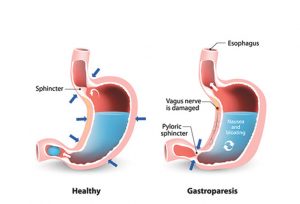By Kathy V. Verdes, APRN, A-GNP-C


Symptoms of Gastroparesis
Gastroparesis manifests in several symptoms, which may vary in intensity among individuals. The most common signs include:
1. Nausea and Vomiting: Feelings of nausea and recurrent vomiting are prevalent symptoms of gastroparesis. Vomiting may occur hours after eating, as the stomach fails to properly empty its contents.
2. Abdominal Discomfort: Individuals with gastroparesis often experience persistent abdominal pain, bloating, and a sensation of fullness, even after consuming small meals.
3. Erratic Blood Sugar Levels: Gastroparesis can disrupt the normal digestion and absorption of food, leading to erratic blood sugar levels in individuals with diabetes.
4. Weight Loss: Due to inadequate absorption of nutrients, unintentional weight loss is common in individuals with gastroparesis.
Causes of Gastroparesis
Gastroparesis can stem from various underlying causes, including:
1. Diabetes: The most common cause of gastroparesis is diabetes, where high blood sugar levels can damage the nerves responsible for regulating stomach contractions.
2. Post-Surgical Complications: Certain surgeries, particularly those involving the stomach or upper digestive tract, can lead to gastroparesis as a result of nerve damage.
3. Neurological Disorders: Conditions such as Parkinson’s disease, multiple sclerosis, and stroke can interfere with the normal functioning of the nerves that control stomach movements.
4. Medications and Lifestyle Factors: Some medications, such as certain antidepressants and opioids, can contribute to delayed stomach emptying. Smoking and excessive alcohol consumption can also worsen gastroparesis symptoms.
Treatment Options for Gastroparesis
While gastroparesis is a chronic condition, several treatment approaches can help manage its symptoms effectively:
1. Dietary Modifications: Adopting a low-fiber, low-fat diet that consists of smaller, more frequent meals can aid digestion. Soft foods and liquids are often better tolerated. Working with a registered dietitian can be beneficial in tailoring a suitable meal plan.
2. Medications: Various medications, such as prokinetics, antiemetics, and antibiotics, may be prescribed to stimulate stomach contractions, control nausea, and prevent bacterial overgrowth.
3. Feeding Tubes: In severe cases where oral intake is inadequate, a feeding tube can be used to deliver liquid nutrition directly to the small intestine.
4. Electrical Stimulation: Gastric electrical stimulation, a procedure involving the implantation of a device to stimulate the stomach muscles, may be considered for individuals who do not respond to other treatments.
5. Psychological Support: Coping with a chronic condition like gastroparesis can be challenging. Seeking psychological support, such as therapy or support groups, can help individuals manage the emotional impact of the condition.
Gastroparesis presents significant challenges for individuals affected by this digestive disorder. Understanding the symptoms, causes, and treatment options is essential for effectively managing the condition and improving quality of life. With proper medical guidance and lifestyle modifications, individuals with gastroparesis can find relief from symptoms and achieve better overall well-being. If you suspect you may have gastroparesis, it is crucial to consult with a healthcare professional for accurate diagnosis and appropriate treatment.
KATHY VERDES APRN, A-GNP- C
Kathy earned her Master’s in Nursing Degree from Kaplan University in 2017. Kathy is certified by the American Academy of Nurse Practitioners (AANP) as an Adult- Gerontology Primary Care Nurse Practitioner (A-GNP-C). Prior to her Advanced Practice Registered Nurse Degree (APRN), Kathy managed a weight loss clinic for over 6 years right here in Naples. Kathy has since then managed acute and chronic care illnesses in different settings, and she genuinely enjoys spending time with her patients.
Are you ready for a consultation?
Your treatment will be performed by a Certified Nurse Practitioner. Schedule your appointment now!
Naples Clinic
7385 Radio Road; Ste., 104, Naples FL 34104
(239) 384-9392
www.Naples-Clinic.com
 Southwest Florida's Health and Wellness Magazine Health and Wellness Articles
Southwest Florida's Health and Wellness Magazine Health and Wellness Articles

